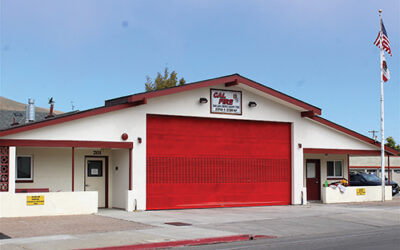The City of Morro Bay’s wish to find a well driller was fulfilled on the second go-round of bidding for a key component of the City’s Water Reclamation Facility Project.
The City Council recently awarded a $346,700 contract to Pacific Coast Well Drilling, Inc., of Paso Robles (see: pacificcoastwelldrilling.com), for “the construction and injection testing of the City’s Injection Well No. 1,” reads the report on the contract award.
The project included a $9,900 “bid alternate” bringing the total contract up to $356,000.
Also called the “Pilot Injection Well,” the project will drill a full-scale groundwater injection well “that will be used initially to perform a pilot injection study. The pilot study will determine injection performance to further characterize the Morro groundwater basin, and the data obtained during the pilot injection study will allow the City to finalize the locations and design characteristics of the other wells that will be included the recycled water facilities component of the WRF Program,” the report said.
The pilot well will be located near the Power Plant Bike Path that runs between Hwy 1 and the rear of the Morro Bay Power Plant property. That’s the area that has been closed to the public for months now, while the project contractor — Anvil — lays the collection system piping down the Class-1 bike path.
The City’s project was billed as a water-recycling scheme that would be capable of producing some 80% of the City’s annual water demand, but the City apparently isn’t sure if it will work.
“The well will be drilled to a depth of approximately 90 feet,” reads the report, “utilizing a mud-rotary method and with a final borehole diameter of 18 inches and a casing diameter of 12 inches. Following the completion of the well, PCWD will perform a pump test and an injection test to collect water quality and hydrogeologic parameter information.”
According to the City’s recent modeling studies of the Morro Creek groundwater aquifer, so-called Indirect Potable Reuse (IPR), “assumed injection rates ranging from 50 to 100 gallons per minute per well and estimated, with an overall injection rate of 825 acre-feet per year, extraction of 994-acre feet per year could be achieved without inducing seawater intrusion. Results from the Pilot Injection Well will allow for further refinement of the injection and extraction scenarios and inform the final design of the recycled water injection system.”
The costs for the well are already included in the WRF’s overall budget and the City said it would not have to dip further into the project’s contingency funds, which is where millions in cost overruns have so far been accounted for.
Spending down the contingencies has meant the City has yet to go back to ratepayers for another increase for the project, which was approved by voters at $126 million but has now ballooned to over $145 million.
Between the contingencies and the savings from favorable loan rates, the City has thus far had plenty of wiggle room, and avoided asking for another rate hike.
It should be noted that Pacific Coast Well Drilling’s bid was actually nearly $4,000 below the engineer’s estimate of $350,000.
Recycling the wastewater is the key component of the WRF Project. It was a main selling point in the City’s project to ratepayers and was also a main point in obtaining Federal and State low interest financing, too.
The initial plan was for a recycling system to replace State Water deliveries, which at 1,313 acre feet a year, are the No. 1 source of drinking water. But a citizen blue ribbon committee that looked at the project determined that the State Water deliveries would remain the top water source, which morphed the WRF to a system to block seawater intrusion in the Morro Creek aquifer and extract water via the existing wells.
The City’s WRF Project includes a new treatment plant being built now on ranchland property above the terminus of South Bay Boulevard at Hwy 1. It also requires an extensive multiple pipe conveyance system that will send raw sewage from the Atascadero Road treatment plant some 3.5 miles to the new plant site, traversing down Atascadero Road, Main, Quintana, and South Bay in a $31-plus million portion of the project. The treatment plant is now at about $75 million. The initial contract to Black & Veatch/Filanc was for about $69 million.
The City’s first attempt to find a well drilling contractor got zero bids. So the package was reworked and put out again for bids, with Pacific Coast Well Drilling landing the contract.


